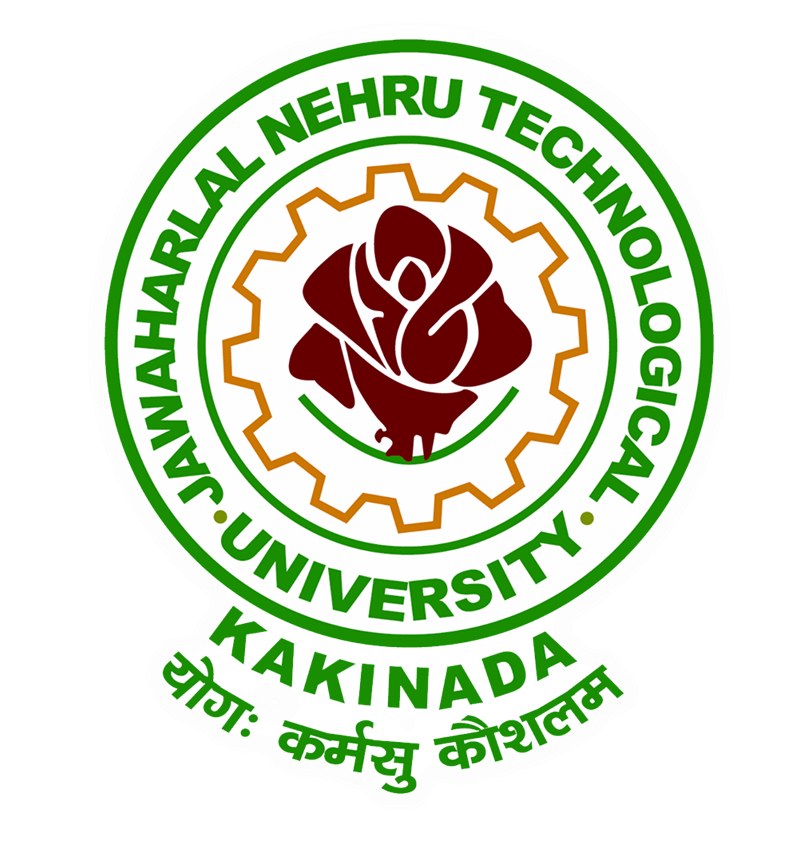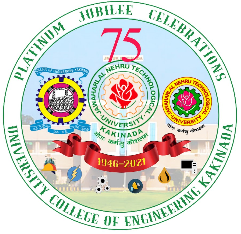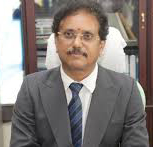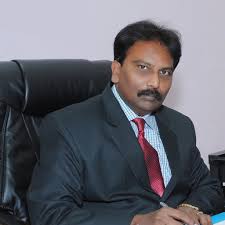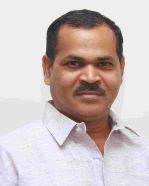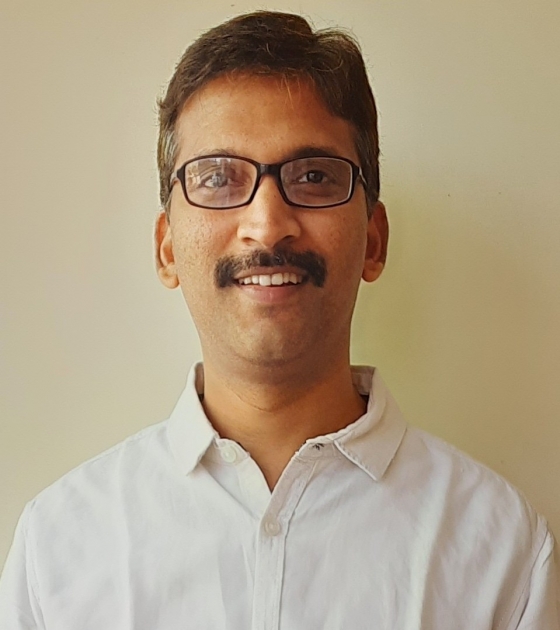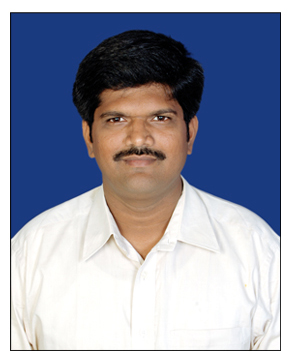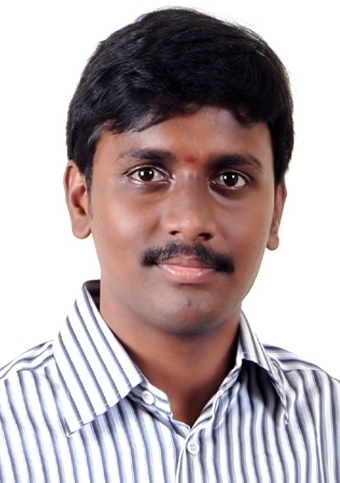HOD’s Desk
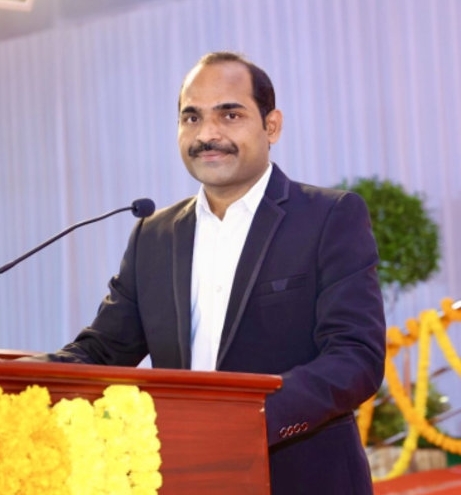
Dr. Venkata Reddy Kota M.Tech, Ph.D
Head of the Department,
Department of Electrical and Electronics Engineering,
University College of Engineering,
Jawaharlal Nehru Technological University,
Kakinada-533003, Andhra Pradesh
Email: kvr@jntucek.ac.in
Department Overview

Department of Electrical and Electronics Engineering
Electrical science is one of the major contributors in the engineering field and its principles are involved in the design, development and construction of nearly all of the electrical, electronics and computing devices and systems. Continued research and development have led to better electronic and computing processes helping the mankind.The department provides the broad knowledge base required for engineers in present global industrial scenario. It takes the maximum advantage of the latest technologies and market opportunities to enrich the learners with updated and advanced know-how of modern technology. The main focus is concentrating on the significant modern developments in the electrical and electronics engineering.
Vision & Mission
Vision
To be in the forefront in advanced research in emerging areas of Electrical & Electronics Engineering, be proactive with industry in technology development and moulding the department into a center of academic excellence.
Mission
M1: To produce high quality Electrical and Electronics Engineering graduates with the requisite theoretical and practical knowledge.
M2: To undertake research & development and extension activities in the field of Electrical and Electronics Engineering in the area of relevance for immediate application as well as for establishing and strengthening the fundamental knowledge.
M3: To create social awareness and ethical values in the graduates so as to contribute in the progress of the society.
PEOs, POs & PSOs
B.Tech
Graduates of the program shall
PEO1: Acquire necessary domain knowledge in the field of electrical and electronics engineering to deal with their challenges solve engineering problems, pursue higher education and research.
PEO2: Be able to apply theoretical and practical engineering knowledge
i) Towards innovation and entrepreneurship that caters the needs of industry and society.
ii) To inculcate an attitude of lifelong learning.
PEO3: Act as team member and team leader and work effectively to develop and design multidisciplinary projects.
PEO4: Be able to acquire social responsibility and ethical values towards the growth and development of society.
M.Tech
Advanced Electrical Power Systems
PEO 1: To enable the students to learn the concepts of electrical power system engineering.
PEO 2: To prepare students in latest technology for carrying out their research and development related to power systems.
PEO 3: To impart Knowledge for enabling the students to work in a collaborative and interdisciplinary environment.
High Voltage Engineering
PEO 1: To enable the students to learn the core concepts of high voltage engineering in order to work effectively work effectively through out their career.
PEO 2: To prepare students in latest technology for carrying out their research and development related to high voltage engineering.
PEO 3: To impart Knowledge knowledge to the students in high voltage engineering for enabling to work in industries.
Power Electronics and Drives
PEO 1: Build self learning capability to deal with constantly evolving tools and technology and work effectively through out their career.
PEO 2: Utilize the concepts of power electronics and drive systems to develop environmental friendly & sustainable technologies.
PEO 3: To impart professional Knowledge in the filed of power electronics and its applications in power sectors and core industries.
B.Tech
PO1: Engineering knowledge: Apply the knowledge of mathematics, science, engineering fundamentals, and an engineering specialization to the solution of complex engineering problems.
PO2: Problem analysis: Identify, formulate, review research literature, and analyze complex engineering problems reaching substantiated conclusions using first principles of mathematics, natural sciences, and engineering sciences.
PO3: Design/development of solutions: Design solutions for complex engineering problems and design system components or processes that meet the specified needs with appropriate consideration for the public health and safety, and the cultural, societal, and environmental considerations.
PO4: Conduct investigations of complex problems: Use research-based knowledge and research methods including design of experiments, analysis and interpretation of data, and synthesis of the information to provide valid conclusions.
PO5: Modern tool usage: Create, select, and apply appropriate techniques, resources, and modern engineering and IT tools including prediction and modeling to complex engineering activities with an understanding of the limitations.
PO6: The engineer and society Apply reasoning informed by the contextual knowledge to assess societal, health, safety, legal and cultural issues and the consequent responsibilities relevant to the professional engineering practice.
PO7: Environment and sustainability: Understand the impact of the professional engineering solutions in societal and environmental contexts, and demonstrate the knowledge of, and need for sustainable development.
PO8: Ethics: Apply ethical principles and commit to professional ethics and responsibilities and norms of the engineering practice.
PO9: Individual and team work: Function effectively as an individual, and as a member or leader in diverse teams, and in multidisciplinary settings.
PO10: Communication: Communicate effectively on complex engineering activities with the engineering community and with society at large, such as, being able to comprehend and write effective reports and design documentation, make effective presentations, and give and receive clear instructions.
PO11: Project management and finance : Demonstrate knowledge and understanding of the engineering and management principles and apply these to one’s own work, as a member and leader in a team, to manage projects and in multidisciplinary environments.
P012: Life-long learning: Recognize the need for, and have the preparation and ability to engage in independent and life-long learning in the broadest context of technological change.
M.Tech
Advanced Electrical Power Systems
PO 1: An ability to independently carry out research/investigation and development works to solve practical problems.
PO 2: An ability to write and present a substantial technical report/document.
PO 3: Students should be able to demonstrate a degree of mastery over the area as per specialization of the program. The mastery should at a level higher than requirements in the appropriate bachelor program.
PO 4: Able to analyze the power system problems for finding appropriate solutions.
PO 5: Able to use simulation software to solve the real time power system problems.
PO 6: Able to model and analyze the renewable energy system problems.
High Voltage Engineering
PO 1: An ability to independently carry out research/investigation and development works to solve practical problems.
PO 2: An ability to write and present a substantial technical report/document.
PO 3: Students should be able to demonstrate a degree of mastery over the area as per specialization of the program. The mastery should at a level higher than requirements in the appropriate bachelor program.
PO 4: An ability to design and analyze insulation for high voltage apparatus.
PO 5: Ability to identify a suitable measurement device for a particular high voltage application.
PO 6: Able to model, design and analyze the power system and high voltage engineering problems using modern simulation tools
Power Electronics and Drives
PO 1: An ability to independently carry out research/investigation and development works to solve practical problems.
PO 2: An ability to write and present a substantial technical report/document.
PO 3: Students should be able to demonstrate a degree of mastery over the area as per specialization of the program. The mastery should at a level higher than requirements in the appropriate bachelor program.
PO 4: An ability to design and analyze control methodologies of machine drives for various applications.
PO 5: An Ability to to employ digital controllers to control power converters and drives.
PO 6: An Ability to select and use suitable power electronic converters for drives and power system applications.
Program Specific Outcomes
PSO1: Able to apply the knowledge gained from Mathematics, stochastic, foundational computing and sciences to formulate practical problems of industry relevance with research focus.
PSO2: Able to apply technical knowledge and usage of modern hardware & software tools related to Electrical & Electronics engineering for solving problems of social relevance.
PSO3: Able to analyze, comprehend, design, develop innovative applications for demonstrating professional expertise, entrepreneurship and develop intellectual property for nation building.
Syllabus
| Regulation Code | Programme Code | Programme Name | Document | Date |
|---|---|---|---|---|
| R13 | 021A02 | B.Tech in Electrical and Electronics Engineering | View | 2025-10-21 |
| R16 | 021A02 | B.Tech in Electrical and Electronics Engineering | View | 2025-10-21 |
| R19 | 021A02 | B.Tech in Electrical and Electronics Engineering | View | 2025-10-21 |
| R20 | 021A02 | B.Tech in Electrical and Electronics Engineering | View | 2025-10-21 |
| R25 | 02 | M.Tech. –Power Electronics & Drives | View | 2025-11-20 |
| R25 | 02 | M.Tech. – Advanced Electrical Power System | View | 2025-11-20 |
| R25 | 02 | M.Tech. – Power Electronics & Drives | View | 2025-11-20 |
| R23 | 021A02 | UCEK -R23 B.Tech III & IV syllabus | View | 2025-12-07 |
| R23 | 021A02 | I B. Tech I Sem Group B Syllabus | View | 2025-12-08 |
| R23 | 021A02 | I B.Tech II Sem R23 Course Structures & Syllabus Group-B (ECE, EEE, CSE, AIML) | View | 2025-12-08 |
Faculty
Contract Faculty

Mr. PRAVEEN ADIMULAM
M.Tech
praveen.adimulam14@gmail.com
Roll of Honours
| # | Register No | Student Name | Department | Year of Pass Out | Percentage | Created At |
|---|---|---|---|---|---|---|
No records found.
| ||||||
Placements
| # | Htno | Student Name | Department | Employee Name |
|---|---|---|---|---|
| 1 | 21021A0220 | Ms. Y. SAI SARANYA | Electrical and Electronics Engineering | GalaxE.Solutions |
| 2 | 21021A0240 | Ms. K. KUSUMA | Electrical and Electronics Engineering | GalaxE.Solutions |
| 3 | 21021A0244 | Ms. K. ISWARYA SAI | Electrical and Electronics Engineering | GalaxE.Solutions |
| 4 | 22025A0260 | N. BALAJI NAIK | Electrical and Electronics Engineering | Tata Consultancy Services |
| 5 | 21021A0229 | D. VIGNESH | Electrical and Electronics Engineering | Tata Consultancy Services |
| 6 | 21021A0235 | C V HEMANTH BHAVANI SAI SREENIVAS | Electrical and Electronics Engineering | Tata Consultancy Services |
| 7 | 21021A0236 | U.V.S SATYA SAI SRIVATSA | Electrical and Electronics Engineering | Tata Consultancy Services |
| 8 | 21021A0202 | BALUM KARTHIK | Electrical and Electronics Engineering | Tata Consultancy Services |
| 9 | 21021A0242 | K.VARA PRASAD | Electrical and Electronics Engineering | Tata Consultancy Services |
| 10 | 21021A0210 | Sri N. Rohith | Electrical and Electronics Engineering | Cognizant |
| 11 | 21021A0232 | Veraswamy | Electrical and Electronics Engineering | DCM Shriram |
| 12 | 21021A0217 | Ms. K. Chaitra Sri | Electrical and Electronics Engineering | Larsen & Toubro |
| 13 | 21021A0241 | Ms. A. Desowja | Electrical and Electronics Engineering | Larsen & Toubro |
| 14 | 21021A0240 | Ms. K. Kusuma | Electrical and Electronics Engineering | Tata Consultancy Services |
| 15 | 21021A0231 | Ms. P. G. S. Sripriya | Electrical and Electronics Engineering | Tata Consultancy Services |
| 16 | 22025A0258 | Sri.Y.Guna Sekhar | Electrical and Electronics Engineering | Reliance Industries Limited |
| 17 | 22025A0259 | Sri.M.V.Lokesh | Electrical and Electronics Engineering | Reliance Industries Limited |
| 18 | 22025A0254 | Sri.Ashif Shaik | Electrical and Electronics Engineering | Reliance Industries Limited |
| 19 | 22025A0255 | Ms.P.Lavanya | Electrical and Electronics Engineering | Reliance Industries Limited |
| 20 | 21021A0220 | Ms.Y.Sai Saranya | Electrical and Electronics Engineering | Reliance Industries Limited |
| 21 | 21021A0210 | N. Rohith | Electrical and Electronics Engineering | JSW Energy |
| 22 | 21021A0235 | V HEMANTH BHAVANI SAI SREENIVAS | Electrical and Electronics Engineering | JSW Energy |
| 23 | 21021A0203 | LAKSHMI PRASANNA | Electrical and Electronics Engineering | Apollo Tyres |
| 24 | 22025A0260 | N. BALAJI NAIK | Electrical and Electronics Engineering | Apollo Tyres |
| 25 | 21021A0236 | U.V.S SATYA SAI SRIVATSA | Electrical and Electronics Engineering | Apollo Tyres |
| 26 | 21021A0242 | K.VARA PRASAD | Electrical and Electronics Engineering | Apollo Tyres |
| 27 | 21021A0227 | Y.MADHURI | Electrical and Electronics Engineering | Apollo Tyres |
| 28 | 21021A0202 | LPABALUM KARTHIK | Electrical and Electronics Engineering | Coromandel |
| 29 | 21021A0206 | P.HYMA | Electrical and Electronics Engineering | Coromandel |
Research and Development
Academic Research
Research Areas
- Order Reduction of Large Scale and Uncertain System
- Adaptive Power System Stabilizers
- Power Quality and Distributed Generation
- Smart Grids and Micro Grids
- Control and Estimation of Induction Motor and Drives
- Hybrid Power Systems
Publications
|
S.No |
FACULTY NAME |
AY (2019-2020) |
AY (2018-2019) |
AY (2017-2018) |
AY (2016-2017) |
Total No. of publications |
|---|---|---|---|---|---|---|
|
1 |
Dr.D.Rajya Lakshmi |
10 |
01 |
04 |
05 |
20 |
|
2 |
Dr.R.Rajeswara Rao |
14 |
12 |
12 |
15 |
53 |
|
3 |
Dr.A.S.N.Chakravarthy |
11 |
03 |
10 |
17 |
41 |
|
4 |
Mr.T.Siva Rama Krishna |
05 |
02 |
0 |
0 |
7 |
|
5 |
Dr.P. Aruna Kumari |
03 |
01 |
01 |
03 |
8 |
|
6 |
Mr.S.Radha Krishna |
0 |
0 |
01 |
02 |
3 |
|
7 |
Mrs.S.Surekha |
04 |
03 |
02 |
04 |
13 |
|
8 |
Mr.R.D.D.V.Sivaram Rolangi |
0 |
0 |
0 |
01 |
1 |
|
9 |
Mr.S.Ashok |
02 |
01 |
0 |
01 |
5 |
MOUs
Facilities
Achievements
Best Paper Presentation Award at ICMACC-24
- Dr. Naga Kota Reddy Chegireddy and Dr. Sai Babu Choppavarapu were honored with the Best Paper Presentation Award for their outstanding work at the IEEE-sponsored International Conference on Recent Trends in Microelectronics, Automation, Computing, and Communications Systems (ICMACC-24), held from December 19-21, 2024, at VNR Vignana Jyothi Institute of Engineering and Technology, Hyderabad
Dr. N. Sumathi, Associate Professor has been appointed as Project Engineer (Electrical), JNTUK Kakinada in October 2024.
Dr. Venkat Reddy Kota, HOD and Professor of EEE, acknowledged and appreciated for his contributions as a reviewer in IEEE INDICON 2024 at IIT Kharagpur.
ENCURSO 2025
- Ms. V. Kavya Sri, a second-year student, secured First Prize in the “Paper Presentation” on Oxygen Suffocation and Counter Measures, organized by the ENCURSO2K25 Paper Presentation team, held at the Department of Electrical and Electronics Engineering, UCEK (JNTUK).
- Mr. T.R.S Karthik, a final-year student, secured Second Prize in the “Novel-Drive-by-Wire Scheme with integrated throttle and Brake for an EVs, organized by the ENCURSO2K25 Paper Presentation team, held at the Department of Electrical and Electronics Engineering, UCEK (JNTUK).
GATE 2025
 Mr. B. Divakar (20021A0213) secured an All India Rank (AIR) of 34 in the Instrumentation Engineering paper and an AIR of 60 in the Electrical Engineering paper in the GATE 2025 examination.
Mr. B. Divakar (20021A0213) secured an All India Rank (AIR) of 34 in the Instrumentation Engineering paper and an AIR of 60 in the Electrical Engineering paper in the GATE 2025 examination. R. Chaitanya (20021A0214) secured an All India Rank (AIR) of 105 in the Instrumentation Engineering paper and an AIR of 285 in the Electrical Engineering paper in the GATE 2025 examination.
R. Chaitanya (20021A0214) secured an All India Rank (AIR) of 105 in the Instrumentation Engineering paper and an AIR of 285 in the Electrical Engineering paper in the GATE 2025 examination. Mr. K. Lokesh, a final-year student, secured an AIR of 519 in the Electrical Engineering paper in the GATE 2025 examination.
Mr. K. Lokesh, a final-year student, secured an AIR of 519 in the Electrical Engineering paper in the GATE 2025 examination. Mr. J. Sai Sri Harsha (19021A0205) secured an AIR of 692 in the Electrical Engineering paper and an AIR of 1433 in the Electronics and Communication Engineering paper in the GATE 2025 examination
Mr. J. Sai Sri Harsha (19021A0205) secured an AIR of 692 in the Electrical Engineering paper and an AIR of 1433 in the Electronics and Communication Engineering paper in the GATE 2025 examination Mr. T. Karthik Raghav Sai, a final-year student, secured an AIR of 807 in the Electronics and Communication Engineering paper in the GATE 2025 examination
Mr. T. Karthik Raghav Sai, a final-year student, secured an AIR of 807 in the Electronics and Communication Engineering paper in the GATE 2025 examination-
Mr. B. Sai Ganesh (19021A0201) secured an AIR of 982 in the Electronics and Communication Engineering paper in the GATE 2025 examination.
-
A former student, 9 students from IV B.Tech, 1 student from III B.Tech qualified in the GATE 2025 examination.
Gold Medal in Skating at State Meet – 2024
- Ms. M. Anusha (24021A0226) secured a gold medal in skating at the state meet held in November 2024, Kakinada, showcasing remarkable talent and dedication. Previously, she earned a silver medal in skating at the 2021 National Championship in Mohali, Punjab, further highlighting her exceptional skills and commitment to excellence.
